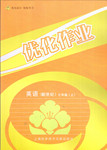题目内容
In the US, when your school doesn’t have a bus, and you live too far to walk, you need a carpool(拼车).A carpool is a group of 36 sharing a car to school in the morning. There are 37 four or five kids in their cars. Parents take turns driving the kids in their cars.
Teamwork (协作)is really important in the carpool because nobody wants to make 38 late for class. If you sit in the car and wait for a classmate for a long time, you’ll probably get a little 39 . Also, your carpool friends might feel the 40 way when you keep them waiting.
You learn a great 41 in responsibility(责任)in the carpool before school ever starts.
| 36. A. teachers | B. drivers | C. students |
| 37.A. usually | B. hardly | C. already |
| 38.A. another | B. the other | C. the others |
| 39.A. angry | B. worried | C. tired |
| 40.A. different | B. wrong | C. same |
| 41.A. use | B. lesson | C. work |
CACAC B

 优化作业上海科技文献出版社系列答案
优化作业上海科技文献出版社系列答案
Amy Chua, well-known as the Tiger Mother, has held the attention of parents all across the US. She told Reader’s Digest that she’s a little strange about how her book struck so many nerves in the US. The reporter of the magazine is sharing the interview with us.
Reader’s Digest: Did you want your book to be controversial (有争议的)?
Amy: I don’t think it would have been controversial at all if it wasn’t for the Wall Street Journal headline that was called, “Why Chinese Mothers are Superior”.
Reader’s Digest: What’s your view on your parenting?
Amy: My children grew up with one Western parent. My husband doesn’t believe in raising his voice with the kids and we don’t spank (打小孩). They were really raised in a half Asian family. My book’s message is that we should try to find the balance. I believe that when children are little, you should restrict (限制) their choices. I like the traditional Chinese way. Respect authority (尊重权利) and don’t just let them watch TV all the time. I don’t think kids under the age of ten can make good choices. But once they start to get older, the lesson I learnt with Lulu (Amy’s second daughter) is that you have to start listening to them. You have to start giving them more choices and more freedom. I really think it’s important to find a balance.
I like the strict Chinese way of discipline (行为准则) and hard work when children are young. But when they’re older, you have to send love to your child, you have to listen to your child and really achieve the balance between creativity, choice and freedom on the one hand, which the west is very good at, and on the other hand, hard work and self discipline, which I think traditional Chinese parenting is very good at.
【小题1】Where can we find the passage?
| A.In a novel. | B.In a magazine. | C.In a comic book. | D.In a history book. |
| A.she is very famous |
| B.parenting is such a common topic |
| C.traditional Chinese parenting is too strict |
| D.the Wall Street Journal headline was called “Why Chinese Mothers are Superior” |
| A.We should control all of the children’s choices. |
| B.Spanking is necessary during children’s growth. |
| C.Children should be raised in half Asian families. |
| D.When children get older, parents should listen to them. |
| A.children respect their parents because of authority |
| B.all kids under the age of ten can make good choices |
| C.some parents don’t believe in raising their voice with the kids |
| D.children do all of the things according to their parents’ orders |
| A.The book that the Tiger Mother wrote is very controversial. |
| B.Traditional Chinese parenting is much better than that in the west. |
| C.The Tiger Mother shows some of her ideas about her book and parenting. |
| D.Parents should achieve the balance between creativity, choice and freedom. |
